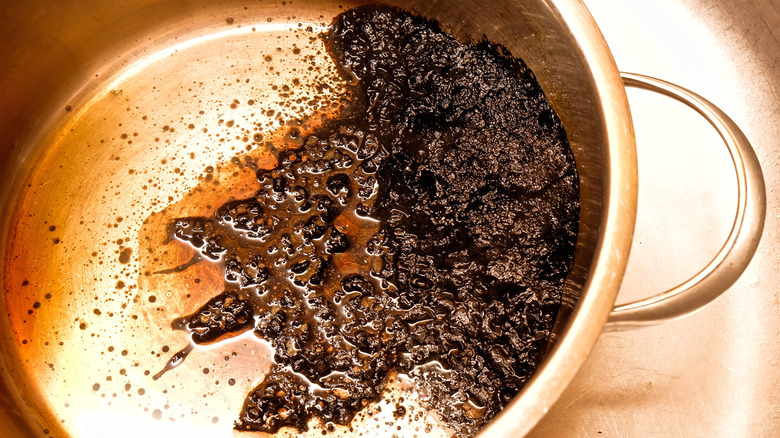What To Do With Burnt Soup
It's happens to the best of us. A pot of soup is bubbling away happily on the stove, so you leave it unattended for a split second. But after an accidental 30 minutes, you return to a potentially inedible disaster. The soup's burned.
Given all the liquid in soup, burning it is an unexpected result. However, Loving Food explains that meats and veggies included in the broth can stick to the bottom of the pot and burn, even without boiling the liquid away. Cooking at too high a temperature or not stirring enough can lead to this culinary disaster.
There is good news. As long as the soup hasn't boiled dry, it can be fixable.
To start, Oprah suggests pouring out the remaining liquid into a new pot but warns to be careful not to scrape any of the burned bits from the bottom. That will only enhance the burned flavor. Once it has switched pots, give the soup a taste; it may be okay as-is. However, if the flavor is funky, there are still a few fixes for attempted salvaging.
How to salvage burnt soup
EHow recommends adding a teaspoon of a sweetener like sugar or honey to help balance the sharpness of the burnt bits. The site also suggests adding canned tomatoes to soups like chili or vegetable to try to dilute any unpleasantness. A touch of acid can also help reduce the charred flavor. Try a dash of vinegar or a squirt of lemon and sample as you go to see if it fades the calcine taste.
Potatoes are fantastic flavor absorbers and may get rid of the scorched seasoning. It's Gone Wrong recommends peeling a few raw potatoes and popping them in the pot, simmering for 45 minutes. Discard them after cooking; they are simply there to absorb the scalded tang.
If these tips don't work, don't discount the meal altogether. According to Epicurious, some people love the taste of charred food, crediting the mishap for unearthing new flavor depths. Dr. Paul Breslin, a Rutgers University professor and a member of the Monell Center, which studies taste and smell, credits the Maillard reaction for creating irresistible food scents and complex flavor profiles, which prove delicious to some palates.

